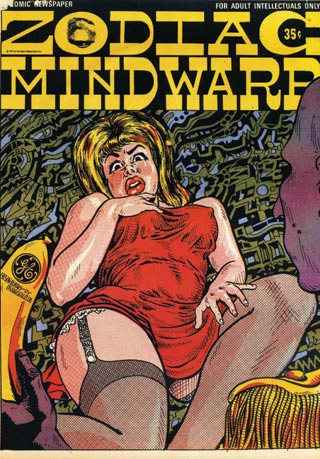Next story: Common Council Report
Road Vultures and Rumbles
by Sal Viglietta

Underground comix legend Spain Rodriguez comes home to Buffalo for a UB exhibit and the Buffalo Comicon
For the cover of My True Story, an autobiographical anthology of his work, cartoonist Manuel “Spain” Rodriguez used one of his many illustrations of a barroom brawl. This one is a real beauty, the royal rumble of bar fights. Bikers, truckers, a blonde frozen in mid-scream—everyone is either pummeling or about to get pummeled. There has perhaps never been so many comic strip sound effects packed onto a single page: ptoomf, wonk, ptaf…even a blump. (That one sounds like it didn’t hurt too bad.) In the center of the melee is Spain himself, ducking slightly, a hint of a smile on his face as he grips the neck of a beer bottle, ready to swing. Bar stools are flying through the air. Chains, wrenches, and fists are poised over the crowd. A thought bubble above one brawler’s head reads, “Someday, this will make a great comic strip.”
Born in Buffalo on March 2, 1940, Spain became a member of the Road Vultures Motorcycle Club in the early 1960s, after he’d returned from a three-year stint at art school in Connecticut. He was working at the Western Electric Company plant and finding what random art work he could on the side, even working at one point as an illustrator for The Spectrum, the student newspaper at the University at Buffalo. The Vultures had a clubhouse on South Ogden Street in south Buffalo. Spain’s comics detailing the gang’s lurid, alcohol-induced rampages through the city and surrounding areas would become famous in later years. But the club had activist inclinations too—the Vultures participated in a march on the Pentagon on October 22, 1967—and they named Spain their Minister of Propaganda. He designed the club’s logo and also produced a leaflet called “Youth Against Legal Terrorism.”
About a month before the Pentagon protest, the club felt that it was being undeservedly harassed by the Buffalo Police Department’s narcotics squad and asked UB professor and journalist Bruce Jackson to write a story about it. While working on the story, Jackson met Spain. “He had a great sense of irony,” Jackson says. “He was politically engaged, and he just exploded the stereotype of what a biker was.”

Indeed, it is impossible to measure which stereotype Spain more blatantly defies: the typical biker or the typical cartoonist. Along with comic luminaries like Robert Crumb and Gilbert Shelton, Spain would eventually become one of the most prolific contributors to the underground comix movement, a surge of rebellious and raunchy art produced in the late 1960s and early 1970s. The movement is widely regarded as a reaction to the 1954 Senate Subcommittee hearings and subsequent introduction of the Comics Code Authority, a committee formed to censor publishers. “They were tremendously inspired by Mad Magazine and other iconoclastic comics of the ’50s,” says Michael Lavin, curator of an exhibit of Spain’s work opening Friday, October 23 at the University at Buffalo. “And they took that one step further.”
A great deal of the work done by Spain’s peers reflects a sort of love affair with self-repression. Crumb’s signature form is the autobiographical musing on self-loathing. His characters consistently do what one can only presume Crumb, at least during some period in his life, did a great deal of himself—they sit around and think about how pathetic they are. One of Shelton’s most popular heroes is the meek-mannered reporter, Philbert Desanex, who in times of great social humiliation transforms into Wonder Warthog, a muscular, grinning beast that relishes its own disgusting physique as much as it does dismembering petty offenders.
Spain’s work from this period is less cloistered. And the destruction in his stories happened on a grander scale. Trashman, a character he created while working for the East Village Other in Manhattan in the late 1960s, is a perpetually outnumbered, leather-jacket-clad enemy of the state, too busy chasing women and fighting the powers-that-be ever to stop and look inward. Spain did comics about the 1968 Democratic Convention in Chicago, and recently published a graphic biography about legendary Marxist revolutionary Che Guevara. Even his Road Vulture stories, with their wanderlust and lawlessness, had a sense of grandeur to them. “He was a revolutionary,” says Emil Novak, comic expert and owner of Queen City Book Store. “The stories were so wild, he had to write about them.”
Spain, who lives and works in San Francisco, will be visiting Buffalo next weekend for the opening of an exhibition of his work at UB and the Buffalo Comicon. (You can read more about the Comicon, sponsored by Queen City Bookstore, at http://queencitybook.com/.)Catch him in person at three separate events:
Friday, October 23—“Road Vultures and Rumbles: A Career Retrospective of Buffalo’s Spain Rodriguez, Underground Comix Pioneer,” an exhibition and symposium presented by the UB Libraries Special Collections with an introduction by Bruce Jackson. 3-10pm. Exhibit runs until December 31. 420 Capen Hall, UB North Campus.
Saturday, October 24—Comics workshops, retailers, movies, and a Kids Comicon section. Author talk and book signing at the Buffalo & Erie County Public Library downtown. 10am-4pm. (This is a PG-rated event).
Sunday, October 25—The Buffalo Comicon at the Marriott Inn on Millersport Highway. Artists, retailers, and signings by Spain. $5 at the door, $4 presale. 10am-5pm.
blog comments powered by Disqus|
Issue Navigation> Issue Index > v8n42 (Week of Thursday, October 15th) > Road Vultures and Rumbles This Week's Issue • Artvoice Daily • Artvoice TV • Events Calendar • Classifieds |









 Current Issue
Current Issue